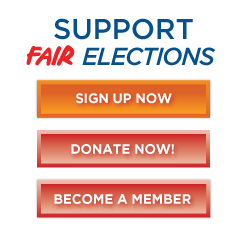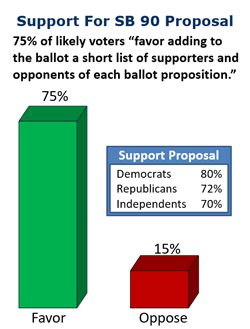About AB 1648, California DISCLOSE Act
Change the Big Money Game with True Transparency
AB 1648 was the 2012 version of the California DISCLOSE Act, which made history by passing the Assembly in August 2012 before running out of time to pass the Senate. Authored by Assemblymember Julia Brownley and sponsored by the California Clean Money Campaign, AB 1648 would have let voters know who is paying for political ads by requiring them to clearly and prominently list their top three funders and logos.
AB 1648 showed the groundswell of support for the California DISCLOSE Act. More than 350 organizations and leaders endorsed AB 1648. Over 84,000 Californians signed petitions urging the legislature to pass the California DISCLOSE Act by its Assembly vote.
AB 1648 had 49 co-authors, including Speaker John Perez, principal co-authors Assemblymembers Mike Gatto (D-Los Angeles, Chair of the Assembly Appropriations Committee) and Paul Fong (D-Mountain View, chair of the Assembly Elections Committee), and independent Assemblymember Nathan Fletcher (I-San Diego).
AB 1648 was a direct follow-up to AB 1148, which received 52 votes in the Assembly on January 31st, 2012, missing its 2/3 vote requirement by only two votes.
AB 1648 passed the Assembly on a vote of 50-26 on August 20, 2012 after being amended to be a majority vote measure to place the California DISCLOSE Act on the November 2014 ballot. See who voted for AB 1648 and who voted against it in the 2011-2012 California Clean Money Scorecard.
Unfortunately, AB 1648 ran out of time to pass the Senate in 2012, but its Assembly victory sets the stage for SB 52, the new California DISCLOSE Act, authored by Senators Mark Leno and Jerry Hill. Please volunteer or become a member to help it pass!
AB 1648 Provisions
- Requires the three largest funders of political ads to be clearly identified with their names and logos — on the ads themselves, so voters know who is actually paying for them.
- Applies to all television ads, radio ads, print ads, mass mailers, and websites for or against state and local ballot measures, and to independent expenditures for and against candidates. It applies whether ads are paid for by corporations, unions, or millionaires.
- Tells voters where to find the details — Requires ads to list a website with greater disclosure and a link to the Secretary of State's website
- Will "pierce through" hidden funders by requiring political ads to report their three largest actual contributors, no matter how many committees or groups their contributions pass through.
- Applies to slate mailers: Requires slate mailers to show when ads are paid for by independent expenditures.
- Requires candidates to appear and say they "approve this message", just like federal candidates.
Disclosure of Big Spenders Works
- The attempt by Texas oil interests to overturn California's landmark climate change law with Prop 23 in 2010 failed because opponents had enough funds to disclose to voters that it was funded by Texas oil companies.
- Despite tens of millions spent in 2010 on Props 16 and 17 by PG&E and Mercury Insurance, both lost because enough people knew they were the largest spenders and took that into account when viewing their ads.
Unfortunately, the largest funders aren't usually as clear as in Props 16, 17, and 23. AB 1648 would make sure they're clear all the time.
AB 1648 is Constitutional and Reasonable
The California DISCLOSE Act doesn't have to wait for a constitutional amendment. California can put it into place itself.
- 8 out of 9 justices in the Supreme Court's Citizens United decision noted the problems when groups run ads "while hiding behind dubious and misleading names" and said we need transparent disclosure for voters "to make informed decisions and give proper weight to different speakers and messages."
- Required radio ad disclosures are shorter than those in current law in most cases — but more effective.
- Print ad and mass mailer disclosure areas are similar in size to current required slate mailer disclosure areas.
See our full comparison to current disclosure law to see how AB 1648 is both reasonable and effective.
"Requiring people to stand up in public for their political acts fosters civic courage, without which democracy is doomed." — Justice Antonin Scalia, writing in Doe v. Reed, 2010
Californians are Ready for the California DISCLOSE Act
- 84% of California voters said they favored legislation to "increase the public disclosure requirements of initiative sponsors to more clearly identify who are its major funders" in the October 13, 2011 Field Poll, including 86% of Democrats, 88% of Independents, and 78% of Republicans.
- AB 1648 is already endorsed by the League of Women Voters of California, California Alliance for Retired Americans, California Clean Money Campaign, California Common Cause, California Church IMPACT, the California League of Conservation Voters, CALPIRG, Consumer Federation of California, Greenlining Institute, Redwood Empire Business Association, Sierra Club California and many others. See the See the full list of endorsers.
"The overwhelming power of money to mislead voters is a profound moral issue."
— Reverend Dr. Rick Schlosser, Executive Director of California Church IMPACT, representing 1.5 million people of faith in California.
Tell voters who is really funding propositions and attack ads when it counts!
Print Before and After Examples

|
|






